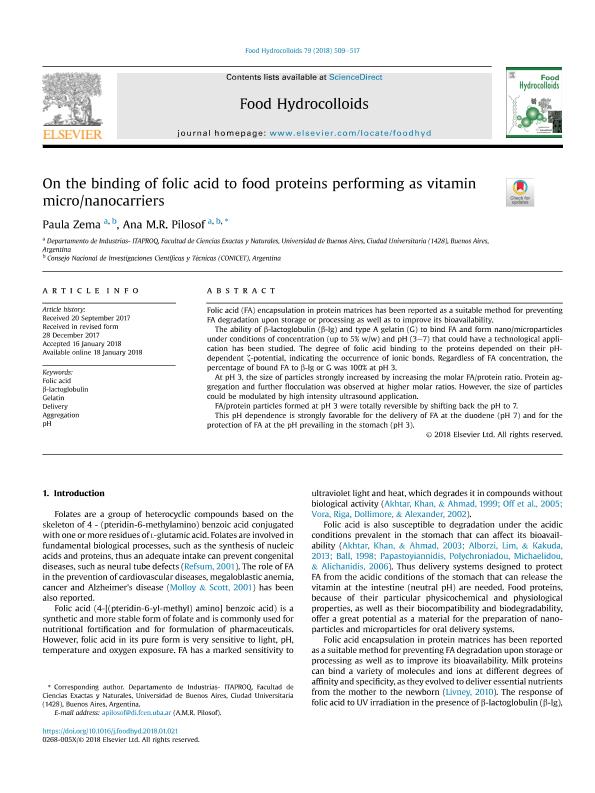Mostrar el registro sencillo del ítem
dc.contributor.author
Zema, Paula Daniela

dc.contributor.author
Pilosof, Ana Maria Renata

dc.date.available
2019-12-26T17:34:42Z
dc.date.issued
2018-06
dc.identifier.citation
Zema, Paula Daniela; Pilosof, Ana Maria Renata; On the binding of folic acid to food proteins performing as vitamin micro/nanocarriers; Elsevier; Food Hydrocolloids; 79; 6-2018; 509-517
dc.identifier.issn
0268-005X
dc.identifier.uri
http://hdl.handle.net/11336/92948
dc.description.abstract
Folic acid (FA) encapsulation in protein matrices has been reported as a suitable method for preventing FA degradation upon storage or processing as well as to improve its bioavailability. The ability of β-lactoglobulin (β-lg) and type A gelatin (G) to bind FA and form nano/microparticles under conditions of concentration (up to 5% w/w) and pH (3–7) that could have a technological application has been studied. The degree of folic acid binding to the proteins depended on their pH-dependent ζ-potential, indicating the occurrence of ionic bonds. Regardless of FA concentration, the percentage of bound FA to β-lg or G was 100% at pH 3. At pH 3, the size of particles strongly increased by increasing the molar FA/protein ratio. Protein aggregation and further flocculation was observed at higher molar ratios. However, the size of particles could be modulated by high intensity ultrasound application. FA/protein particles formed at pH 3 were totally reversible by shifting back the pH to 7. This pH dependence is strongly favorable for the delivery of FA at the duodene (pH 7) and for the protection of FA at the pH prevailing in the stomach (pH 3).
dc.format
application/pdf
dc.language.iso
eng
dc.publisher
Elsevier

dc.rights
info:eu-repo/semantics/openAccess
dc.rights.uri
https://creativecommons.org/licenses/by-nc-sa/2.5/ar/
dc.subject
AGGREGATION
dc.subject
DELIVERY
dc.subject
FOLIC ACID
dc.subject
GELATIN
dc.subject
PH
dc.subject
Β-LACTOGLOBULIN
dc.subject.classification
Otras Nanotecnología

dc.subject.classification
Nanotecnología

dc.subject.classification
INGENIERÍAS Y TECNOLOGÍAS

dc.title
On the binding of folic acid to food proteins performing as vitamin micro/nanocarriers
dc.type
info:eu-repo/semantics/article
dc.type
info:ar-repo/semantics/artículo
dc.type
info:eu-repo/semantics/publishedVersion
dc.date.updated
2019-12-16T19:10:53Z
dc.journal.volume
79
dc.journal.pagination
509-517
dc.journal.pais
Países Bajos

dc.journal.ciudad
Amsterdam
dc.description.fil
Fil: Zema, Paula Daniela. Universidad de Buenos Aires. Facultad de Ciencias Exactas y Naturales. Departamento de Industrias. Instituto de Tecnología de Alimentos y Procesos Quimicos. Consejo Nacional de Investigaciones Científicas y Técnicas. Oficina de Coordinación Administrativa Ciudad Universitaria. Instituto de Tecnología de Alimentos y Procesos Quimicos.; Argentina
dc.description.fil
Fil: Pilosof, Ana Maria Renata. Universidad de Buenos Aires. Facultad de Ciencias Exactas y Naturales. Departamento de Industrias. Instituto de Tecnología de Alimentos y Procesos Quimicos. Consejo Nacional de Investigaciones Científicas y Técnicas. Oficina de Coordinación Administrativa Ciudad Universitaria. Instituto de Tecnología de Alimentos y Procesos Quimicos.; Argentina
dc.journal.title
Food Hydrocolloids

dc.relation.alternativeid
info:eu-repo/semantics/altIdentifier/url/http://linkinghub.elsevier.com/retrieve/pii/S0268005X17316120
dc.relation.alternativeid
info:eu-repo/semantics/altIdentifier/doi/http://dx.doi.org/10.1016/j.foodhyd.2018.01.021
Archivos asociados
